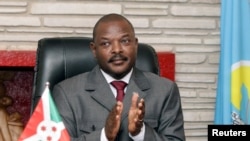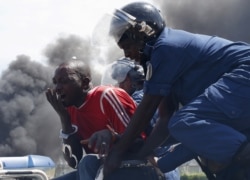The sudden death of outgoing Burundian President Pierre Nkurunziza Tuesday came as a shock to everyone on the African political scene. Nkurunziza ruled Burundi with an iron first for 15 years, including a controversial third term that saw hundreds killed in protests and more than half a million fleeing the country. Some expect nothing will change on how the east African nation handles its governance.
Burundi has begun seven days of mourning after the death of President Pierre Nkurunziza, who died Monday at a hospital in the town of Karuzi.
The government said Nkurunziza died from cardiac arrest, but there is speculation the cause might have been COVID-19, the disease caused by the coronavirus. Local media reported the late president’s wife was flown to a Nairobi hospital last week after contracting the virus.
Nkurunziza was due to step down in August and hand power to the winner of last month's election, retired army general Evariste Ndayishimiye.
Domitien Ndayizeye handed power to Nkurunziza in 2005, at the end of Burundi’s civil war. He said the main task given to Nkurunziza was to implement a political agreement between the Hutu majority and Tutsi minority.
“When he came to power, we were just about to agree on the Arusha agreement. It has been agreed that he will follow and implement the Arusha agreement, he has done his best, maybe there have been some issues that he has not been able to reach, and I think the next president will go on," he said.
The agreement signed in Tanzania ended a civil war that claimed the lives of more than 300,000 people.
Some opposition politicians accused the late president of violating the constitution when he ran for a third term in 2015. His government was also accused of unleashing the ruling party youth wing, known as Imbonerakure, on its opponents.
Lewis Mudge is a Burundi researcher with Human Rights Watch.
“Most of my time, I was documenting abuses which were committed by Imbonerakure, which were the youth militia aligned with the ruling CNDD-FDD party, and many of these crimes were happening, sort of almost hidden. But what we are really seeing post-2015 is Nkurunziza giving the green light for these Imbonerakure, the youth militias…we see them really become used as the enforcers across the country. The rise of Imbonerakure will be Nkurunziza’s defining characteristic of his human rights record,” said Mudge.
In 2017, Burundi became the first country to withdraw from the International Criminal Court after being accused of committing crimes against humanity.
Burundi also closed offices of the United Nations on human rights, and in May expelled officials from the World Health Organization.
Last week, four journalists were imprisoned to terms of two-and-a-half years for investigating political unrest in the northwest of the country.
Mudge said the human rights situation may not improve with the passing of Nkurunziza.
“I don’t think we are going to see much change with the death of Nkurunziza with regards to the human rights standard. It went beyond one individual. So, I think we are unfortunately looking at dark days ahead,” said Mudge.
Nelleke van de Walle, deputy director for central Africa at the International Crisis Group, said the future of Burundi depends on what the political system left behind by Nkurunziza will do in the coming months.
“He was expected to remain influential because he was appointed supreme guide of patriotism, so it was likely that he continued to play a role in the political scene in Burundi with his death. It's possible that Evariste has more freedom of movement to act more independently. But then again, Nkurunziza is only one man, and his rule was underpinned by a political system, and that system is very much in place,” she said.
For now, the speaker of parliament will be in charge of the affairs of the state, until the president-elect is sworn in on August 20.







